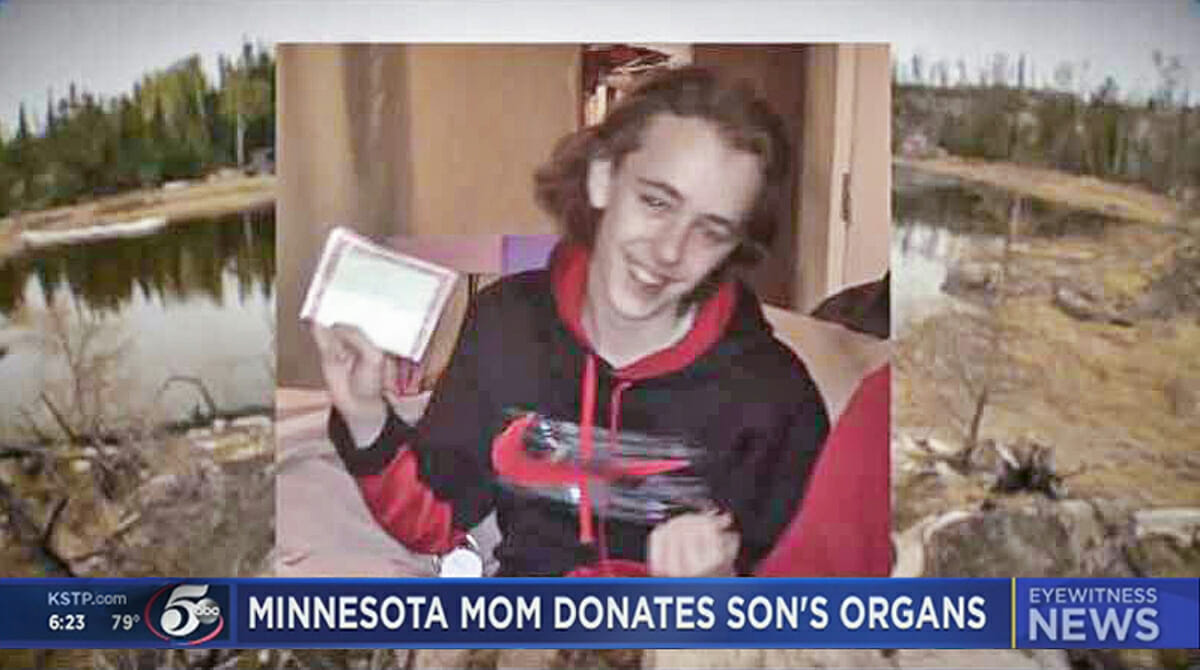Amidst Chaos, Tristan Saved 4 Lives Through Organ Donation
Tristan had the rare opportunity to become an organ donor. Only a small percentage of people will get the chance due to medical criteria at the time of death.

Growing up, Tristan Miller was a happy, helpful little boy. His mom, Jeanine, remembers him as mature for his age – always protecting his younger brother, Quentin. He grew up loving new experiences and adventure.
“It’s hard to sum up a person in a matter of a few words,” Jeanine said. “[Tristan] liked to live. He was one of those kids who questioned everything – had to figure things out for himself. He didn’t live a boring life.”
On Sunday, May 24, 2020, now all grown up, 19-year-old Tristan and 17-year-old Quentin took their ATVs to a favorite fishing spot near their home in northern Minnesota. The fish weren’t biting, so Tristan jumped on his ATV and headed home. As he pulled away, Quentin heard the loud hum of Tristan’s ATV in the distance, then suddenly, it stopped.
Quentin knew something was wrong. He rushed to find Tristan’s ATV had collided with a tree. Quentin called for help then tried to revive his brother.
After the police arrived, Tristan was airlifted to North Memorial Hospital in Robbinsdale.
Jeanine and her family drove the three hours to be with Tristan. Due to the COVID-19 restrictions, guests were limited to one person for one hour, but North Memorial Hospital made exceptions.
“They were very generous at the hospital,” Jeanine said. “We were thankful for that.”
Tristan’s doctor said they were doing everything they could to save him, but the outlook was grim. Next came a lot of waiting.
As Tristan’s condition worsened, Jeanine remembers sitting in the hospital on Tuesday, May 26, learning – through Facebook – of the civil unrest happening around them in response to the murder of George Floyd. She and her family were staying with her aunt in the Twin Cities and the freeways between her home and the hospital were impacted. They made it to her aunt’s home that night, but Jeanine could barely wrap her mind around what was happening – her son was in critical condition at a hospital far from home amidst a pandemic and civil unrest.
On Friday, May 29, Tristan’s condition deteriorated to brain death. After receiving the referral call from the North Memorial staff, LifeSource reached out the family. Because Tristan passed away in a hospital on a ventilator (thanks to the heroic actions of his brother Quentin), Tristan had the rare opportunity to become an organ donor. Only a small percentage of people in the United States who pass away get that chance. This video by LifeSource explains the criteria and how the donation process works.
Tristan hadn’t registered as a donor on his driver’s license, so the decision was left to the family. For Jeanine, it was an easy “yes”.
“Tristan took pride in helping other people and making them happy,” she said. “He wanted to be the guy who saves the day. I didn’t see a better way to honor his life then to allow someone else to continue theirs.”
LifeSource Family Support Coordinator, Erica Staples, walked Jeanine through the donation process and what to expect.
LifeSource staff are experts in supporting families through some of the hardest moments of their lives. Jeanine was grappling with how to share the news of Tristan’s death to his younger sister, Annabelle. Erica offered some advice and to bring the book, The Next Place to the hospital to help with the conversation. It’s a resource the LifeSource Donor Family Aftercare team sends all donor families in the support box provided a few weeks after the loss of their loved one.
“[Erica] was so thorough and helpful,” said Jeanine. “I couldn’t hope for a better experience if I had to go through this experience at all.”
Back at the LifeSource office in North Minneapolis, Karen Hecimovich, Manager of Organ Recovery and Preservation Services, was assembling a team to recover Tristan’s gifts. The LifeSource Donor Services Center was also sending out organ offers to potential recipient matches through the United Network for Organ Sharing (UNOS).
“Every gift counts,” said Susan Gunderson, LifeSource CEO. “Lives hang in the balance. We knew we had to do everything in our power to fulfill the family’s wishes, leave a legacy for Tristan and save lives through donation and transplantation.”
Tristan’s gifts saved four lives:
- Tristan’s heart and left kidney would go to a 58-year-old male;
- His liver went to a 43-year-old male;
- The pancreas to a 25-year-old female; and
- A kidney to a 32-year-old male.
Due the curfews and safety concerns, Tristan’s organ recovery surgery was delayed from Friday night to Saturday.
This delay was the right choice for the safety of the recovery staff, but a hard one for Jeanine. “Once you’ve made the decision to donate, you’re ready to be done” she said.
A variety of heroes stepped up to ensure Tristan’s gifts could be recovered and transplanted, saving as many lives as possible, including Dennis – a driver from Total Transportation.
Typically, LifeSource would transport themselves in official vehicles to the donor hospital, but with the curfews looming and civil unrest, Total Transportation, a Saint Paul-based company, was called to transport the organ recovery team. After learning what he was providing transportation for, the driver – Dennis – was extremely committed to helping donation happen on this day he offered to do whatever was needed to make the donation happen. He ended up driving Karen, with one of the kidneys, directly to the M Health Fairview to deliver the kidney to the waiting transplant surgeons and recipient.
Related:
KSTP: 19-year-old killed in Cass Count ATV crash saves 4 lives through organ donation
 Skip to main content
Skip to main content
